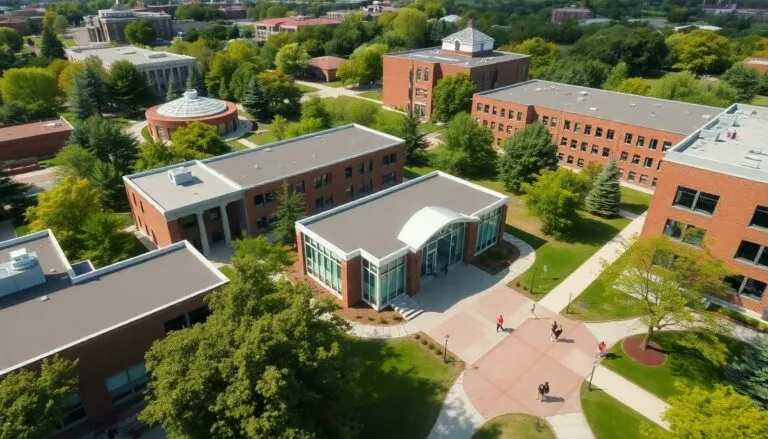Table of Contents
ToggleNavigating the tumultuous waters of young adulthood can feel like trying to ride a unicycle on a tightrope while juggling flaming torches. With pressures from school, work, and social life, it’s no wonder some young adults find themselves in need of a lifeline. Enter rehab—a place not just for recovery, but also for rediscovery.
Imagine swapping late-night parties for late-night therapy sessions that actually help. Rehab for young adults offers a chance to hit the reset button, learn coping skills, and find a community that understands the struggle. It’s not just about kicking bad habits; it’s about embracing a brighter, healthier future. So why not take the plunge? After all, the only thing riskier than seeking help is not seeking it at all.
Overview of Rehab for Young Adults
Rehab programs tailored for young adults address unique challenges faced during this transitional life stage. Emphasizing a supportive environment, these programs focus on treating substance abuse and behavioral issues while promoting personal growth.
Programs often incorporate therapy sessions, group discussions, and recreational activities. Therapists use evidence-based approaches to equip participants with practical coping strategies. Through these methods, young adults learn to manage stress and emotional difficulties effectively.
Facilities frequently foster peer connections, allowing individuals to share experiences and build supportive relationships with others who face similar struggles. Engaging in group therapy can enhance motivation and accountability, creating a sense of community among participants.
Family involvement plays a crucial role in many rehab programs. Supportive family members enhance the recovery process by participating in family therapy sessions, fostering understanding and healing. Education on addiction helps families provide the necessary support at home after the rehab journey.
Integration of life skills training further prepares young adults for independent living. Teaching essential skills like budgeting, time management, and job-seeking ensures successful reintegration into society. Many programs also offer aftercare services to support sustained recovery beyond initial treatment.
Rehab for young adults provides holistic care by addressing emotional, psychological, and social factors. Programs strive to cultivate resilience and adaptability, empowering individuals to pursue fulfilling lives free from addiction’s constraints.
Importance of Early Intervention
Early intervention plays a crucial role in the recovery journey for young adults facing substance abuse and behavioral issues. Addressing these challenges promptly can significantly enhance the chances of long-term success.
Impact on Long-Term Recovery
Long-term recovery outcomes greatly benefit from early intervention strategies. Research shows that individuals who receive support early tend to sustain sobriety more effectively. They learn essential coping skills, making it easier to navigate stressors that may have contributed to substance use. Engaging in rehab during formative years also instills a sense of accountability and self-efficacy, further reinforcing resilience. Young adults empowered through early intervention are less likely to experience relapses compared to those who delay treatment.
Family Involvement in Treatment
Family involvement significantly enhances the effectiveness of treatment. When families participate in the rehab process, they contribute valuable support and understanding. Engaged family members help create a stable environment outside of treatment, promoting a smoother transition back to everyday life. Educational programs provide families with tools to communicate effectively and manage crises. Research highlights that young adults with strong family support networks experience improved recovery rates and lower relapse risks. Prioritizing family involvement ensures that the young adult feels connected and supported throughout their healing journey.
Types of Rehab Programs
Rehab programs for young adults come in various formats to cater to individual needs. These formats range from intensive residential care to more flexible outpatient options.
Inpatient Rehab
Inpatient rehab provides structured treatment in a live-in facility. Participants engage in daily therapy sessions and group activities in a supportive environment. This immersive experience offers young adults a break from everyday stressors and helps them focus on recovery. Around-the-clock medical supervision ensures safety and addresses any potential withdrawal symptoms. Additionally, young adults benefit from peer interactions, fostering connections that support shared experiences. Programs typically last 30 to 90 days, allowing ample time for deeper personal exploration and skill development.
Outpatient Rehab
Outpatient rehab allows young adults to maintain daily routines while receiving treatment. Participants attend scheduled therapy sessions several times a week, balancing treatment with school or work commitments. This flexibility accommodates responsibilities, promoting a gradual transition back to normal life. Regular counseling and group therapy sessions help individuals practice coping strategies in real-world settings. Family involvement often enhances the support system, making it easier for young adults to navigate challenges together. Programs vary in duration and frequency, catering to the unique circumstances of each young adult in recovery.
Challenges in Rehab for Young Adults
Rehab for young adults presents unique challenges affecting treatment and recovery. These obstacles often stem from external perceptions and internal struggles.
Stigma and Accessibility
Stigma surrounding substance abuse affects young adults’ willingness to seek help. Many fear judgment and discrimination from peers, which discourages them from entering rehab. Accessibility also poses significant challenges. Young adults often face financial barriers, as insurance may not cover all rehab services. Geographic location can limit options, particularly in rural areas with fewer facilities. These factors create a need for improved awareness and resources to encourage young adults to pursue treatment without shame.
Emotional and Mental Health Considerations
Emotional and mental health issues significantly impact recovery in young adults. Many individuals struggle with co-occurring disorders like depression and anxiety, complicating their treatment journey. Addressing these mental health challenges is crucial for lasting recovery. Young adults often need tailored therapy approaches that resonate with their experiences. Support from peers also plays a vital role, as shared experiences foster understanding and connection. Moreover, integrating mental health care into rehab programs enhances overall effectiveness, promoting comprehensive healing.
Success Stories and Case Studies
Rehab programs for young adults often yield remarkable success stories that highlight the transformative power of treatment. One young adult, Sarah, entered an inpatient program struggling with substance abuse and anxiety. Through an immersive treatment plan that included therapy sessions and group activities, she developed coping skills and significantly improved her mental health.
James shared a similar experience. He participated in an outpatient program that allowed him to balance his recovery with college commitments. With regular counseling and the support of his family, James increased his accountability and stayed committed to his journey, leading to lasting sobriety.
Anna’s story emphasizes the importance of peer connections in rehab. By forming friendships with fellow participants, she found a sense of community that motivated her to stay engaged in her recovery. These relationships fostered accountability, allowing Anna to overcome her addiction and embrace a healthier lifestyle.
Another case involved a young man named Mike, who faced financial barriers that made accessing treatment challenging. A community-based rehab program helped him navigate these challenges. Through financial assistance and counseling services, he successfully completed his program and regained control over his life.
Each of these stories illustrates the effectiveness of tailored rehab programs that address the unique needs of young adults. Emotional support from family and friends plays a crucial role in their recovery. Programs integrating mental health care and life skills training equip participants with the tools needed for a successful reintegration into society.
These case studies exemplify how early intervention and a comprehensive approach lead to positive and sustainable outcomes for young adults in rehab.
Conclusion
Rehab for young adults stands as a vital resource in the journey toward recovery and personal growth. By providing tailored programs that address the unique challenges of this life stage, young adults can find the support they need to overcome substance abuse and behavioral issues. The emphasis on peer connections and family involvement fosters a nurturing environment that enhances motivation and accountability.
With early intervention and comprehensive care, individuals can develop essential coping skills and life strategies that pave the way for a brighter future. Each success story reinforces the transformative potential of rehab, highlighting its role in empowering young adults to embrace healthier lifestyles and achieve lasting recovery.







